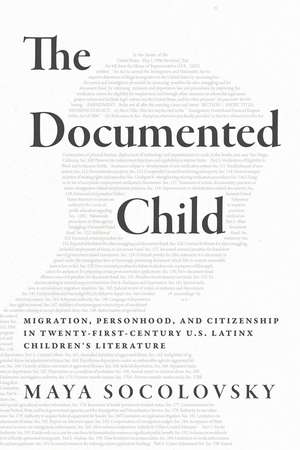The Documented Child: Migration, Personhood, and Citizenship in Twenty-First-Century U.S. Latinx Children's Literature
Autor Maya Socolovskyen Limba Engleză Paperback – 4 feb 2025
Through a critical inquiry into picture books and middle-grade and young adult literature, Socolovsky argues that the literary documentations of—and for—U.S. Latinx children have shifted over the decades, from an emphasis on hybrid transnationalism to that of a more American-oriented self. Socolovsky delves into texts written from 1997 to 2020, a period marked by tremendous changes in U.S. immigration policies, amplified discourses around nationhood, and an increasingly militarized border. The author shows how children’s and young adult books have shifted their depictions of the border, personal and national identity, and sovereignty.
For students, scholars, and educators of Latinx studies and children’s literature, this work shows how the creators of children’s literature reflect new strategies for representing the undocumented Latinx child protagonist. While earlier books document the child as a transnational (sometimes global) subject, later books document her as both a transnational and U.S. national subject. The Documented Child explores this change as a necessary survival strategy, reflecting current awareness that cultural hybridity and transnational identity are not sufficient stand-ins for the stability and security of legal personhood.
Preț: 258.04 lei
Nou
Puncte Express: 387
Preț estimativ în valută:
49.38€ • 52.80$ • 41.17£
49.38€ • 52.80$ • 41.17£
Carte disponibilă
Livrare economică 27 martie-10 aprilie
Preluare comenzi: 021 569.72.76
Specificații
ISBN-13: 9780816554003
ISBN-10: 0816554005
Pagini: 298
Ilustrații: none
Dimensiuni: 152 x 229 x 23 mm
Greutate: 0.3 kg
Editura: University of Arizona Press
Colecția University of Arizona Press
ISBN-10: 0816554005
Pagini: 298
Ilustrații: none
Dimensiuni: 152 x 229 x 23 mm
Greutate: 0.3 kg
Editura: University of Arizona Press
Colecția University of Arizona Press
Notă biografică
Maya Socolovsky is an associate professor of English and Latinx literature at the University of North Carolina at Charlotte. She is a contributor to numerous journals, and the author of Troubling Nationhood in U.S. Latina Literature.
Cuprins
Acknowledgments
Introduction: Documenting Latinx Children
1. Material Literacies: Migration and Border Crossings in Pat Mora’s Tomás and the Library Lady, Luis J. Rodriguez’s América Is Her Name, and Amada Irma Pérez’s My Diary from Here to There
2. “What Should We American Farmers Be Without the Distinct Possession of That Soil?” Homesteading and the Cultivation of Citizenship in Cynthia DeFelice’s Under the Same Sky and Julia Alvarez’s Return to Sender
3. Narratives of Shame and Healing: Tourism, Consumerism, and Solidarity in Malín Alegría’s Sofi Mendoza’s Guide to Getting Lost in Mexico
4. Borderland Ethics, Migrant Personhood, and the Critique of State Sovereignty in Jairo Buitrago’s Two White Rabbits and José Manuel Mateo’s Migrant: The Journey of a Mexican Worker
5. Disappearance, Documentation, and Sovereignty in Alexandra Diaz’s The Only Road and The Crossroads
6. The Dreamer Brand: Immigration, Storytelling, and Commodification in Alberto Ledesma’s Diary of a Reluctant Dreamer: Undocumented Vignettes from a Pre-American Life and Maria Andreu’s The Secret Side of Empty
Conclusion
Notes
Works Cited
Index
Introduction: Documenting Latinx Children
1. Material Literacies: Migration and Border Crossings in Pat Mora’s Tomás and the Library Lady, Luis J. Rodriguez’s América Is Her Name, and Amada Irma Pérez’s My Diary from Here to There
2. “What Should We American Farmers Be Without the Distinct Possession of That Soil?” Homesteading and the Cultivation of Citizenship in Cynthia DeFelice’s Under the Same Sky and Julia Alvarez’s Return to Sender
3. Narratives of Shame and Healing: Tourism, Consumerism, and Solidarity in Malín Alegría’s Sofi Mendoza’s Guide to Getting Lost in Mexico
4. Borderland Ethics, Migrant Personhood, and the Critique of State Sovereignty in Jairo Buitrago’s Two White Rabbits and José Manuel Mateo’s Migrant: The Journey of a Mexican Worker
5. Disappearance, Documentation, and Sovereignty in Alexandra Diaz’s The Only Road and The Crossroads
6. The Dreamer Brand: Immigration, Storytelling, and Commodification in Alberto Ledesma’s Diary of a Reluctant Dreamer: Undocumented Vignettes from a Pre-American Life and Maria Andreu’s The Secret Side of Empty
Conclusion
Notes
Works Cited
Index
Recenzii
“In this sweeping, exhaustive study of Latinx children’s and young adult literature, Maya Socolovsky explores how authors of youth literature contend with the ever-shifting nature of U.S. immigration policy and rhetoric. Exploring contradictory theories of personhood and legality, Socolovsky analyzes the urgent conditions under which undocumented children migrate and survive in the U.S. landscape.”—Cristina Herrera, co-author of Latinx Teens: U.S. Popular Culture on the Page, Stage, and Screen
“The Documented Child is a beautifully written and thoughtful examination of citizenship, nation, and migration in U.S. Latinx children’s literature. It offers brilliant and close analysis of a broad selection of texts that range from juvenile novels to chica lit to picture books. This study is essential.”—Phillip Serrato, contributor to Voices of Resistance: Interdisciplinary Approaches to Chican@ Children’s Literature
“The Documented Child is a beautifully written and thoughtful examination of citizenship, nation, and migration in U.S. Latinx children’s literature. It offers brilliant and close analysis of a broad selection of texts that range from juvenile novels to chica lit to picture books. This study is essential.”—Phillip Serrato, contributor to Voices of Resistance: Interdisciplinary Approaches to Chican@ Children’s Literature
Descriere
Looking at picture books and middle-grade and young adult literature written from 1997 to 2020, The Documented Child demonstrates how the portrayal of Latinx children has dramatically shifted and discusses how these shifts map onto broader changes in immigration policy and discourse in the United States.
